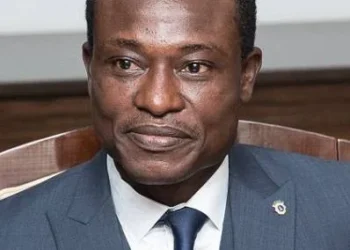Independent governance and accountability analyst Alfred Appiah has warned that Ghana’s recurring cycle of public sector financial scandals will persist if government institutions continue to treat technology upgrades as the primary solution rather than addressing deep-seated governance and oversight failures.
Speaking in reaction to the recent Auditor-General’s forensic audit report on the National Service Authority (NSA) ghost names scandal, Appiah said that while technological systems can help streamline operations, they are ultimately ineffective when public officials deliberately bypass controls for personal or political gain.
“Our elected and appointed officials often take the easy route by replacing vendors or technology whenever problems arise. Take the National Service Authority, for example.
“It recently replaced its previous system as a supposed solution to the persistent problem of ghost names. But if you read the Auditor-General’s forensic audit report, the main issue wasn’t the technology itself. It was people deliberately bypassing the system.”
Alfred Appiah
According to Appiah, the findings from the forensic audit underscore a troubling pattern in Ghana’s public administration—where the state invests millions in digital reforms, only for human interference and weak oversight to undermine them.
He stressed that the problem lies not in the machines or software but in the deliberate manipulation of system controls by individuals within the chain of command.
“The technology had several control features built in, yet they were intentionally overridden. Replacing the system may create gigs for preferred vendors, but it won’t fix the underlying governance and accountability issues”.
Alfred Appiah
Appiah’s comments follow revelations from the Auditor-General’s investigation, which confirmed the existence of thousands of fictitious names on the NSA payroll, resulting in the loss of billions of cedis.

The audit also found that some officials had deliberately bypassed digital authentication processes to authorize payments to ghost beneficiaries.
Long Term Reforms
While the Attorney General and Minister for Justice, Dr Dominic Ayine, has already begun criminal proceedings against some implicated officials, Appiah insists that long-term reforms require more than reactive measures.
He believes preventive oversight, automation, and transparency must form the backbone of any credible solution.
“There needs to be more proactiveness. Traditional audits will always look backward, and it’s not sustainable to conduct forensic audits frequently. The solution lies in improving governance and oversight.
“Some of the audit tests performed by the Auditor-General can be automated, and they should be. If there are excessive overrides, that should be known in near real time—not years later or only after power has changed hands.”
Alfred Appiah
He argued that the tools and technical expertise already exist within government institutions to implement continuous monitoring systems.

The real challenge, he said, is the political will to institutionalize transparency across agencies and make system governance a shared responsibility among multiple stakeholders.
“The results of the automated audit tests shouldn’t just be seen by the NSA and its board but also by the Auditor-General, the national technology agency, and civil society.
“Limited access could even be given to the media. That way, oversight isn’t just internal; it becomes public and participatory.”
Alfred Appiah
Multi-Layered Governance
For him, this form of multi-layered governance is what can create real accountability and deter manipulation.
“If the governance of the technology doesn’t improve, we’ll be right back in a few years talking about ghost names at the NSA again. By that time, people will have looted again, and we’ll all be shouting ‘eiii’ at press conferences by the Attorney-General.”
Alfred Appiah
Appiah’s remarks touch on a broader debate in Ghana’s governance landscape: the growing tendency to equate digitalization with reform, even when institutional accountability remains weak.
Analysts have repeatedly pointed out that while Ghana has made significant progress in automating its public financial systems—from the Ghana Integrated Financial Management Information System (GIFMIS) to the e-Procurement and payroll systems—corruption scandals continue to surface because of human override and limited real-time transparency.
In recent years, the National Service Authority, the Youth Employment Agency, and the Ghana Education Service have all been implicated in payroll-related scandals, with ghost workers siphoning funds through coordinated internal collusion.
Appiah believes that until Ghana strengthens governance frameworks around its digital infrastructure, these cyclical scandals will continue to erode public trust and drain national resources.

He further urged the government to align its digital transformation agenda with stronger policy safeguards, including automated red flags for suspicious financial activities, cross-agency data sharing, and mandatory publication of audit trails for payroll and procurement systems.
Appiah’s critique comes at a time when Ghana’s Operation Recover All Loots campaign—spearheaded by the Mahama administration—has intensified efforts to prosecute public officials and recover stolen state funds.
For reform advocates like him, however, criminal prosecutions, while necessary, must be complemented by systemic reforms that make looting impossible, not just punishable.























